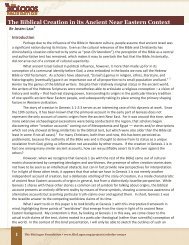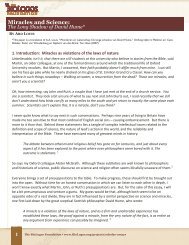What Scientists Do In this scholarly essay, Steve Benner - BioLogos
What Scientists Do In this scholarly essay, Steve Benner - BioLogos
What Scientists Do In this scholarly essay, Steve Benner - BioLogos
You also want an ePaper? Increase the reach of your titles
YUMPU automatically turns print PDFs into web optimized ePapers that Google loves.
The <strong>BioLogos</strong> Foundation • www.<strong>BioLogos</strong>.org/projects/scholar-<strong>essay</strong>s<br />
For <strong>this</strong> reason, practicing scientists who wish to advance their general theoretical framework need<br />
to identify parts of the received view that are wrong, but only if that "wrongness" is ready to be found.<br />
How do they go about doing <strong>this</strong> Generally, scientists start by making observations of the type that have<br />
not been previously made. <strong>In</strong> the case of Francis Collins, one might begin by sequencing the human<br />
genome. This is observation on the grand scale, building a model that places over 100 billion atoms in the<br />
molecules that support human genetics.<br />
<strong>Scientists</strong> may then look within these for observations that are puzzling, that are not obviously what<br />
is expected given their paradigms, something that needs explanation. Not, for example, that the Sun rose<br />
<strong>this</strong> morning in the East; expected things do not demand explanations. But something that is not, at first<br />
glance, like it should be. Explanations are demanded only when things are not as they should be.<br />
<strong>Scientists</strong> will then attempt to account for the puzzling observation using paradigms within their<br />
received view. More often than not, things work out. The puzzle can be resolved. The scientists publish a<br />
paper, get promoted within the academy or industry, and move on to the next puzzle.<br />
This exercise, called "normal science" by Thomas Kuhn, sometimes fails. Sometimes, the puzzle<br />
cannot be solved by applying the theories and models that are accepted in the culture. This could be, of<br />
course, a sign that the puzzling observation being was incorrectly made; perhaps the instrument used to<br />
make the observation was broken. Alternatively, the scientist might simply not know enough about<br />
currently accepted theory to solve the puzzle. Alternatively, failure to solve the puzzle could indicate that<br />
the received view contains an incorrect element.<br />
These three possibilities have different prescriptions. If the observation is wrong, we should repeat<br />
the observation; if we do not have enough funding to do the experiment again, we must abandon the<br />
puzzle. If we do not know enough physics to solve a problem, we should learn more physics, or perhaps<br />
hand the puzzle over to someone else who already knows the physics. But if the underlying theory is<br />
wrong, we should try to construct an alternative theory, something new.<br />
<strong>In</strong> these remarks, we find ourselves knee deep in the<br />
sociology of science. <strong>What</strong> scientists actually do depends on what<br />
grants they have, what their university dean is telling them, what is<br />
going on at home, or any of many other factors that have nothing to<br />
do with the science itself. The most common outcome may be to<br />
abandon the puzzle to find another that is easier to solve using<br />
extant theory. This sociology accounts in part for the rarity with<br />
which scientists actually advance theory. Historically, observations<br />
that demand the rejection of a paradigm are often long known long<br />
before some scientist picks up the challenge in the way that actually<br />
rejects the paradigm.<br />
But let us follow the thread that has a scientist picking up<br />
that challenge and actually proposing a new paradigm, one that<br />
rejects a paradigm that is part of the culture. At <strong>this</strong> point, the<br />
dynamics change.<br />
First, the scientist who introduced the theoretical innovation<br />
becomes interested in seeing that innovation accepted. Those in the community who did not introduce the<br />
innovation do not have <strong>this</strong> interest. On the contrary, many are interested in opposing the innovation,<br />
5<br />
<strong>What</strong> <strong>Scientists</strong> <strong>Do</strong><br />
BY STEVEN BENNER




